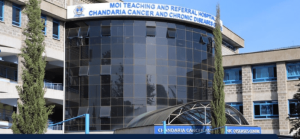How AMPATH Makes a Difference in Kenya

Moi Teaching and Referral Hospital (MTRH) serves a population of approximately 24 million people and is the setting where students and residents get practical, hands-on experience. MTRH has a bed capacity of 1,063 patients, an average number of 1,200 patients at any time and about 1,500 outpatients per day.
Who We Serve
AMPATH Kenya partners provide care to the western half of Kenya and neighboring countries with a population of more than 24 million people.
Health Priorities
- HIV, TB, malaria and other infectious diseases
- Non-communicable diseases including cancer, diabetes, hypertension, cardiovascular and renal disease and mental health
- Maternal, Newborn and Child Health
Population Assets
- Strong communities
- Focus on the family
- Leadership commitment to health and Universal Health Coverage
Key Priorities
Care
- HIV
- Sustainability
- AMRS AI and Data Science
- UHC
- Hematology/Oncology
- Mental Health
- Integrating non-communicable disease (NCD) care into facility and community-based care programs
- Cardiovascular surgery
- Infectious disease
- Orthopedics
- Burn care
- Neurodevelopment
- Radiology
- Dermatology
- Maternal, newborn and child health
- Pediatric ICU
- Adolescent health
Education
- Strengthening of Community Based Education and Service (COBES) through sustainable approaches e.g. including in some budget lines in funded research and care projects, optimizing on the new office of the AMPATH grant writer to scout for funding that supports student field placements
- Increase the number of learners who get opportunities for exchange programs by seeking new ways of funding
- Scale up of clinical fellowship programs across all clinical departments. The support of super specialists from collaborating institutions in curriculum development and initial teaching is crucial
- Improving of biomedical science labs and simulation stations for undergraduate students with a focus on better technology (eg. better lab equipment, regular availability of reagents, mannequins and investment in virtual dissection tables
- Implement a structured research mentorship for postgraduates and young faculty.
Research
- Strengthen development of a well-resourced and sustainable infrastructure for research that enables the efficient conduct of high-quality research
- Increase the number of successful independent investigators working in collaborative, interdisciplinary research teams by providing better access to high-quality training and mentorship
- Enhance supportive, research-intensive cultures within the schools and departments of all AMPATH partners
- Accelerate growth in relevant, high-yield research initiatives that will improve policy and strengthen the health systems and communities we serve including biomedical innovations, health economics/ equity, population health, informatics and implementation science research
- Incorporate research into ongoing efforts to expand AMPATH innovations to additional underserved populations outside Kenya.
